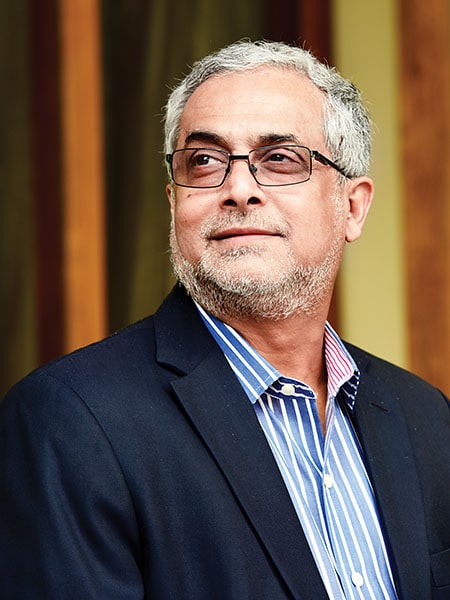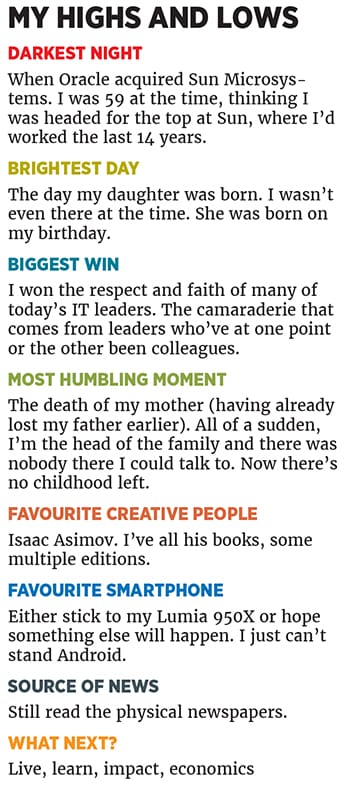
Technology must amplify the best of humanity: Microsoft India's former chairman
Bhaskar Pramanik believes new-age technologies like Artificial Intelligence will complement human capacity and give people super powers in the near future

Of Asimov and strange acronyms: Bhaskar Pramanik
Bhaskar Pramanik, 65, capped a corporate career spanning 45 years with six years at Microsoft India, from where he retired last month as chairman. A science fiction fan and lover of awkward acronyms for action plans, Pramanik remains optimistic about technology for the good of all. He tells Forbes India that disruption is taking place at the bottom of the pyramid, and that our values must evolve with advancements in technology. Edited excerpts:
Q. It is often thought that some great technologies have had very long gestation periods at Microsoft. How is that changing?
I would actually agree with that, but it’s changing now. The current philosophy in Microsoft that is stemming from Satya [Nadella, the CEO] and the leadership team is that we need to cut some of these time cycles to half of what they used to be. If you take HoloLens [the first self-contained, holographic computer], work on it would have probably started 15 years ago. In the new scheme of things, most probably, we would have launched it five years earlier than what we are seeing as of now.
Consider the earlier company where I worked: Sun Microsystems, which popularised ideas like ‘the network is the computer’ and ‘we are the dot in dotcom’, was a company that was 10 years ahead in terms of products, technologies and innovation. For instance, today’s Internet of Things, the smart cars… we used to call it Java on wheels. So these concepts have been around, but the market wasn’t ready.
Today, the marketplace is ready. In certain cases, it was the same issue with Microsoft—that some of its technologies were ahead of the curve—especially for enterprise customers.
Q. Tell us about some of the big bets at Microsoft today, including artificial intelligence (AI).
If you look at some of the technologies that we’re putting big bets on, the first one is AI—creating systems which learn, think and act. That’s my personal definition. In certain cases, they may replace humans, but I think in most cases, they will complement human capacity and give all of us super powers. It will amplify humans. It will amplify everyone from IT professionals to musicians. We can make leaps of faith and get to decisions that could even be wrong, but we can’t process large volumes of data in parallel.
The second aspect is that our attention spans are short. AI will look at all the data available and compute the options, and a human can decide. Eventually, AI will also decide, in many cases. Where those decisions involve ethics and morality, it will take time for AI to evolve to that level of decision-making.
The second area of investment for Microsoft is quantum computing. Moore’s law for Silicon is ending, with transistors being worked so close already, that physical limits are being reached. And quantum computing promises the ability to build a nation’s computing requirements in devices the size of a smartphone.
Another related area is biological computing, using DNA for storage, and Microsoft is also looking at it. Then there are areas like cancer research, where there may not be a generic cure, but there may be ways to tailor cures for individuals.
Augmented reality (AR), with HoloLens, throws up innumerable possibilities. A simple event like handing out an award to an employee for being a star performer could be enhanced, made a richer experience, using the AR presence of various leaders in the company. Then there are applications like space research, education, skilling and so on—there will be the death of time and distance.

As technology evolves, so must our values. We are in this world, where we have Stone Age emotions, medieval institutions and god-like technology and that’s a perfect recipe for chaos. As human beings get more educated, they get more inclusive—an idea we’re far away from at the present moment—then you will see that adoption of technology will be done in such a way that it will favour mankind, or at least a bulk of mankind. Then you need the institutions, the regulatory bodies to provide those policies, those controls or checks—as in Europe on data privacy, for instance.
Yes, national security is going to be more important, but how do you balance that with privacy? Human emotion, the institutions and technology have to sort of get synchronised; at present, they are not. Tech is moving at such a fast pace, leaving the other two behind. That’s why Satya always likes to say that as technology evolves, we must bring our values to the fore and ensure that the tech is used in sync with our values.
Q. Why the optimism?
I’m optimistic because I read a lot of science fiction as a kid. From the age of 11 or 12, I used to read science fiction, and Isaac Asimov was my favourite author. His laws of robotics are so simple. He calls it the positronic brain into which the laws are built. No robot can harm a human being. Then the second law was no robot, through its inaction, can hurt a human being. The third one was, no robot will harm another robot, or something along those lines. I’ve always believed, technology, when you read science fiction, was always about the good of mankind. The other aspect of science fiction was that as tech evolves, the human also evolves. I’ve always been positive about technology for the good of mankind.
Q. If you were to distill your experience into guiding principles that helped you do the right thing throughout your career, what would they be?
I’ve an acronym for it. It’s called CCIIP. To me as a leader, my values are critical for me, which I have to project. The first C is courage, to learn, to make mistakes, to learn from them and do the right thing. The second C is for collaboration. Nobody is as smart as all of us, so you make sure that any major decision involves a bunch of people; you get consensus, you acknowledge that and then you must have the courage to take the right decision if you’re the leader in that situation. The I is for innovation. The need for innovation is so much more today than when I graduated from IIT Kanpur. There, it was about applying tech to solve a problem. Today it’s also about breakthroughs because unless we have disruptive innovation, companies can die overnight.
The next I is about integrity. My father was in the Indian Air Force, and I grew up in a world where my word was important. If you ever find yourself in a situation where you have a reputation for low integrity, you will find it difficult to build back the trust. Your reputation will precede you. I’ve worked in India for so long, but I’ve always walked away (from bribes and enticements). You must be willing to walk away to give that clear message if you want to maintain your integrity.
And the P stands for pace. When people say in India we have lots of time, acknowledge that we don’t. A deal delayed is market share lost. A lot of people say, ‘Oh I didn’t get it this quarter, I’ll get it next quarter’. My point is, you lost market share. My principle in life is that when you get up in the morning, think of the three hardest things you have to do that day and do them first. Don’t put them off. Do what you can today.
We are much more customer- and partner-focussed than six years ago.
Q. How has Microsoft India changed under your watch?
We are much more customer- and partner-focussed than we were six years ago. The core of who we are, what we do, why we have meetings, where we spend most of our time, where we learn the most is from our customers and partners. Previously we were a product and technology company. We had great products and technology and then we started looking for customers.
Recently, we announced a partnership with Tata Motors. If you go through the announcement, there isn’t one bit about the product. It’s about how we’ll help build a connected car, what it means to the consumer and to Tata Motors. We talk about the experience one will have while driving a car that will be enabled by Microsoft’s technologies, but not about the individual pieces that will be sold. In the past, we would have said, they’re going to buy 10,000 units of PCs or 3,000 users worth of server licences or 50,000 office licences. That’s the difference.
Second, most large companies tend to focus on their customers and the larger the customer, the more effort they will put. Every year they’ll do a study saying ‘What do you want from us?’ and every time they will ask for something a little incremental. The innovation is actually taking place with customers who are not your customers. And you never go there. So ‘not your customers’ is your best source of innovation and you never go there. So you get incremental innovation.
Disruption is taking place at the bottom of the pyramid. Not your largest customer, but the young guy who’s going to come and take over that category. And that’s why we come in late.
The third, which I feel very good about, is we are much more diverse and inclusive. Diversity is about balance in representation and if you look at gender, specifically, in the past, we used to be about under 15 percent (about five years ago) and today we’re about 24 percent—the proportion of women employees at Microsoft India—and I’m still not satisfied with that. My goal was to take it to 35 percent, if not higher. Why not 50:50?
Q. Do you see in India startups that can build Blue Ocean tech businesses?
We’re very bullish, as company and me personally as an individual. It will happen in the next three to five years. If you think about India Stack, to me that’s innovation at a mass scale. Nobody has attempted something like this—a paperless, cashless presence-less system, which everybody can use and adopt with APIs (application programming interface). That’s just the beginning, and as it has the government of India’s backing, there will be other things that will emerge.
I see cyber security as another area where there could be local products that will be of immense value to companies like Microsoft, technology companies and to end-user customers. I think as the market in India evolves, with Digital India and what is happening with digitalisation, I think we will start seeing those innovations that will catch the imagination of the rest of the world.
The problem is most of the current startups, even the unicorns, are just aping the business models from somewhere else, and adapting some technology to some extent. There is nothing new that is being created. Even the ideas are not new.
(This story appears in the 30 November, -0001 issue of Forbes India. To visit our Archives, click here.)
X





